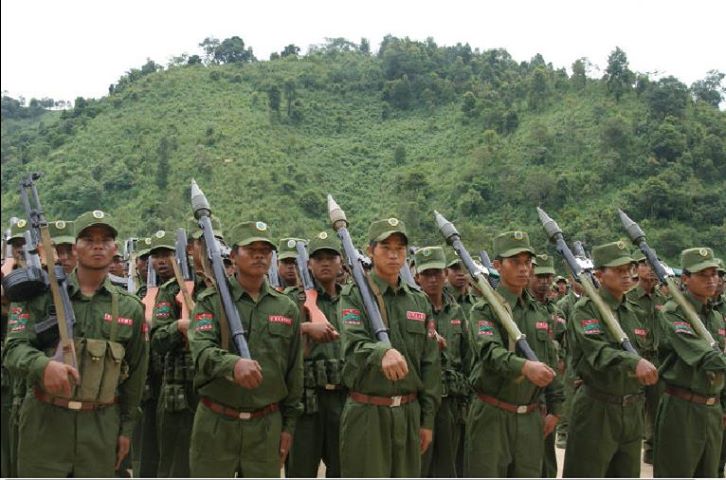Burma’s most powerful ethnic armed group, accused by the United States of running a narco-empire that has flooded Asia with illegal drugs, has rejected the allegation, saying Washington has blacklisted its leaders for political reasons.
The United Wa State Army (UWSA) boasts some 30,000 soldiers who control a secretive, China-dominated statelet the size of Belgium in the remote hills on Burma’s eastern border.
After decades of isolation, leaders of the self-proclaimed Wa State invited a small group of foreign journalists to visit its territory – a first step in a tentative opening up to the outside world prompted by Aung San Suu Kyi’s dramatic victory in a historic general election in Burma last year.
Reaching an accord with the Wa and other armed groups is one of the biggest challenges faced by Burma’s first democratically-elected government in decades, as it grapples with the interlocking issues of ending years of ethnic wars and tackling drug production in its lawless border areas.
“After the civilian government took office, we come down to the capital more often and we try to demonstrate what we have achieved,” said the Wa territory foreign affairs minister, Zhao Guo An, in a rare interview in the region’s capital Panghsang.
“The Wa State wants overseas investment. Bosses get rich first, and then the Wa State can develop.”
At present, much of the money underpinning the Wa’s state-within-a-state is widely believed to be derived from the trade in methamphetamine, known locally as “ya ba” or “crazy medicine”.
Soaring use of “ya ba”, much of it said by experts to come from the so-called “Golden Triangle” that includes the Wa territory, has fuelled hardline anti-narcotics policies in Southeast Asia, such as the bloody “war on drugs” waged by the Philippines’ President Rodrigo Duterte.
The United States indicted several UWSA leaders on heroin and methamphetamine trafficking charges in 2005.
“They are making those decisions based on their own political interests,” said Zhao, when asked about why the UWSA and some of its leaders were listed in US Treasury Department sanctions lists for alleged involvement in the drugs trade.
“The problem of ya ba can’t be solved by one region. Many of the drugs are brought in from abroad … people continue to defame the Wa State. This is not fair.”
Opium and Rubber
Reuters journalists travelled across the rugged Wa territory, possibly the least-known part of Southeast Asia where Westerners have had less access than to North Korea.
The region used to be one of Burma’s largest poppy-growing areas, but, under international pressure, Wa leaders say they replaced poppy fields with plantations, mostly rubber, but also coffee and tea, more than a decade ago.
Many plantations are backed by investors from China or Taiwan, alongside businessmen connected to the Wa State leadership.
Rubber trees line the region’s freshly-paved roads, which snake for hundreds of kilometres through emerald mountains.
The region cultivates some 220,000 acres of rubber and has been hit by falling rubber prices due to waning demand from China.
Wa leaders say that as part of its push to get rid of poppy, they relocated some 100,000 citizens – a sixth of the population – between 1999 to 2002 to the southern part of the state on the Thai border, where they say the land is more fertile.
Government officials described the relocation as “miserable” and said that “dozens” died along the way because of disease and road accidents.
But local people told Reuters that drug use was a problem in the Wa region, which suffers from a chronic lack of basic government services.
“Every six months, police looks for drug users on the streets – this is called a special project,” said a migrant worker from another part of Burma, picking tea leaves at a plantation that has replaced a poppy field.
“At that time, I am too afraid to go outside – I am worried that I could be wrongly arrested.”
Other Wa residents said they worried for their children due to the ease of access to drugs.
“The drugs are very easy to buy everywhere,” said a Burmese migrant working as a cook in Panghsang, who has a five-year-old son. “Ya ba tablets – that’s the biggest problem.”
[related]
The Wa government’s justice secretary, Li San Lu, said it was working hard to tackle the drug issue, and had arrested about 1,000 people this year for drug use, production or trafficking.
He said Wa authorities had seized two tons of meth entering the region from China, India and Burma, including both the finished product and precursor drugs used to produce it.
“Ya ba comes from overseas. Wa State is a victim … we have banned the plantation, trade and use of drugs,” said Li. “Ya ba is coming from China, India, Myanmar and Thailand. We are clueless.”



